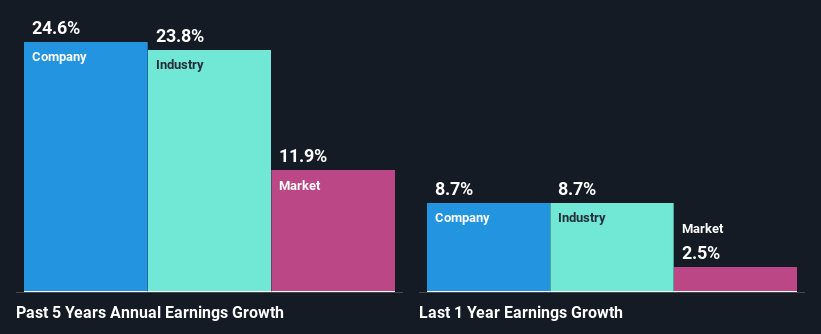Stock Analysis
Christian Dior SE's (EPA:CDI) Stock Is Going Strong: Is the Market Following Fundamentals?

Christian Dior's (EPA:CDI) stock is up by a considerable 18% over the past three months. Given the company's impressive performance, we decided to study its financial indicators more closely as a company's financial health over the long-term usually dictates market outcomes. In this article, we decided to focus on Christian Dior's ROE.
Return on Equity or ROE is a test of how effectively a company is growing its value and managing investors’ money. Simply put, it is used to assess the profitability of a company in relation to its equity capital.
See our latest analysis for Christian Dior
How Do You Calculate Return On Equity?
ROE can be calculated by using the formula:
Return on Equity = Net Profit (from continuing operations) ÷ Shareholders' Equity
So, based on the above formula, the ROE for Christian Dior is:
26% = €16b ÷ €60b (Based on the trailing twelve months to December 2023).
The 'return' is the profit over the last twelve months. Another way to think of that is that for every €1 worth of equity, the company was able to earn €0.26 in profit.
What Is The Relationship Between ROE And Earnings Growth?
So far, we've learned that ROE is a measure of a company's profitability. Based on how much of its profits the company chooses to reinvest or "retain", we are then able to evaluate a company's future ability to generate profits. Assuming everything else remains unchanged, the higher the ROE and profit retention, the higher the growth rate of a company compared to companies that don't necessarily bear these characteristics.
Christian Dior's Earnings Growth And 26% ROE
To begin with, Christian Dior has a pretty high ROE which is interesting. Additionally, a comparison with the average industry ROE of 26% also portrays the company's ROE in a good light. Therefore, it might not be wrong to say that the impressive five year 25% net income growth seen by Christian Dior was probably achieved as a result of the high ROE.
Next, on comparing Christian Dior's net income growth with the industry, we found that the company's reported growth is similar to the industry average growth rate of 24% over the last few years.

Earnings growth is a huge factor in stock valuation. It’s important for an investor to know whether the market has priced in the company's expected earnings growth (or decline). This then helps them determine if the stock is placed for a bright or bleak future. Has the market priced in the future outlook for CDI? You can find out in our latest intrinsic value infographic research report
Is Christian Dior Using Its Retained Earnings Effectively?
Christian Dior has a three-year median payout ratio of 37% (where it is retaining 63% of its income) which is not too low or not too high. So it seems that Christian Dior is reinvesting efficiently in a way that it sees impressive growth in its earnings (discussed above) and pays a dividend that's well covered.
Besides, Christian Dior has been paying dividends for at least ten years or more. This shows that the company is committed to sharing profits with its shareholders.
Conclusion
In total, we are pretty happy with Christian Dior's performance. In particular, it's great to see that the company is investing heavily into its business and along with a high rate of return, that has resulted in a sizeable growth in its earnings.
Valuation is complex, but we're helping make it simple.
Find out whether Christian Dior is potentially over or undervalued by checking out our comprehensive analysis, which includes fair value estimates, risks and warnings, dividends, insider transactions and financial health.
View the Free AnalysisHave feedback on this article? Concerned about the content? Get in touch with us directly. Alternatively, email editorial-team (at) simplywallst.com.
This article by Simply Wall St is general in nature. We provide commentary based on historical data and analyst forecasts only using an unbiased methodology and our articles are not intended to be financial advice. It does not constitute a recommendation to buy or sell any stock, and does not take account of your objectives, or your financial situation. We aim to bring you long-term focused analysis driven by fundamental data. Note that our analysis may not factor in the latest price-sensitive company announcements or qualitative material. Simply Wall St has no position in any stocks mentioned.
About ENXTPA:CDI
Christian Dior
Christian Dior SE, through its subsidiaries, engages in the production, distribution, and retail of fashion and leather goods, wines and spirits, perfumes and cosmetics, and watches and jewelry worldwide.
Adequate balance sheet with acceptable track record.

